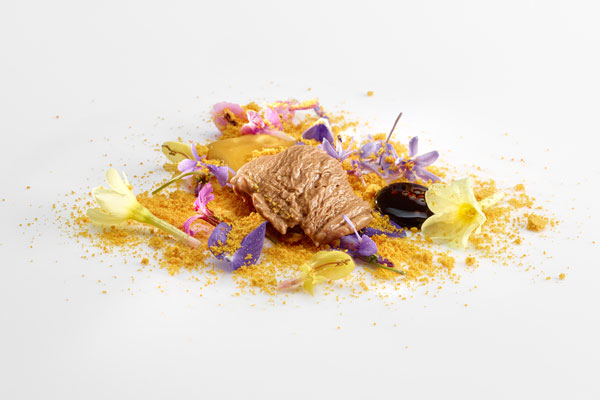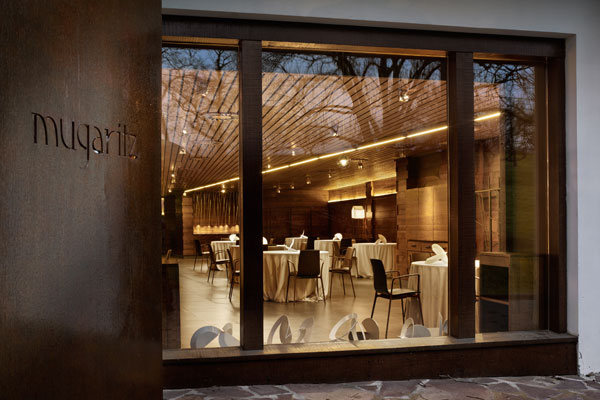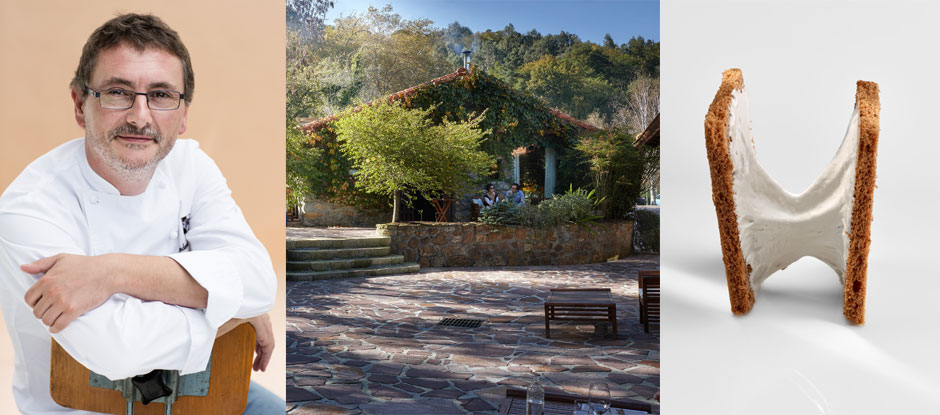Header: chef Andoni Luis Aduriz (image: Alex Iturralde), his restaurant Mugaritz and To each his own (image: José Luis López de Zubiría)
As part of the 50 Best BBVA Scholarship, one talented aspiring cook will complete a stage in the kitchens of both Andoni Luis Aduriz at Mugaritz and Dominique Crenn at Atelier Crenn.
Now considered one of Spain’s most pioneering chefs, Aduriz started out as a stagiaire with the legendary Ferran Adrià at El Bulli and spent almost four years interning in different restaurants. Here, he tells us about his enlightening period at El Bulli, the challenges of developing his own style and a desire to share Mugaritz’s knowledge with budding chefs.
I started my career studying at a cooking school in San Sebastian. I noticed that those classmates whose parents had contacts in the industry were going to the best restaurants to do their stages. I couldn’t do that because I didn’t know anyone and there were very few places available.
That generated a great desire in me. I was hungry to learn. I told myself I had to work harder than anyone else because if no one would open those doors for me, I'd have to open them myself.
The first restaurant I worked at was a pizzeria owned by Ramón Roteta, whom I considered a great chef. I would have loved to work at his flagship restaurant Ramón Roteta in Hondarribia. It had a Michelin star and was considered one of the best restaurants in the Basque region. For 13 months, I went to work at the pizzeria every day after school, including weekends and holidays.
I had a strong desire to work with fresh, new ingredients. When I was working at the pizzeria, every day the doors of the delivery van opened and I saw the fresh produce going to Ramón Roteta. I saw fruit arranged in beautiful boxes, wonderful fresh hake and so many other fantastic ingredients. Then the doors closed and those products went to Ramón’s flagship restaurant.
After that period, Ramón had become my mentor and he helped me get more stages. I worked at Zuberoa, Neichel, Arzak, Akelarre and El Bulli. I spent three to four years doing stages in different restaurants while training in culinary school. Aduriz' creation From bitter to sweet
Aduriz' creation From bitter to sweet
What motivated me was my hunger for knowledge. I suddenly realised I had a lot to learn. I needed to discover new techniques, I needed to understand why the great chefs of that time were cooking the way they were, I needed to understand their thinking and the products.
At the time, I had no vocation nor did I imagine that I would ever own a restaurant. I didn’t do all my stages with that in mind. I simply did it because I had an intellectual hunger. I wanted to learn, that was the only goal.
When I started my stage at El Bulli in 1993, I had a mini crisis because everything that was happening there broke the rules I had followed until then. The whole way of thinking was different and, when you’ve had an orthodox training, it can be difficult.
I overcame the crisis at El Bulli because I had the ability and flexibility to adapt my thinking and to realise that I was there to learn new things. In reality, I had found what I was looking for: a new way of understanding cuisine. I worked as an intern for a year before I was offered a contract.
The stage at El Bulli was incredible because Ferran [Adrià] drew out the creativity in us. Beyond creativity, at El Bulli I learned rigour. Not only in the sense of discipline, but also honesty. At that time, we still had to convince the world that what we were doing at El Bulli was worthwhile.
The passion we felt there was incredible, even though it wasn’t matched by our customers. There were days when we had no customers at all, especially at the beginning of the season. But I had never seen that level of rigour and commitment. It didn’t matter if the restaurant was empty.
I was fascinated by the fact that Ferran didn’t give up under any circumstances. Every day we went down to the market in Roses and picked all the best ingredients, despite the huge cost.
Every day we wanted to do things better, and then better again, to always be impeccable. That mindset helped me when I opened my own restaurant, Mugaritz. Most people conventionally think that success is having a full restaurant or having people queueing outside from the day you open. But that’s not even close to what it really is.
Aduriz's restaurant Mugaritz in Errenteria, Spain (image: José Luis López de Zubiría)
A restaurant is only as big as the people who have worked there. You can measure a restaurant’s worth in many ways – awards, popularity and other things. For us, it’s about its legacy. How many people who worked in that restaurant are now making a difference around the world? That is a much better measurement.
Working with young people at Mugaritz, I have learnt that passion isn’t just love for cooking, but also a will of steel. It’s a will that is like water: once it’s out, there is no way to stop it, it steeps everywhere. Sometimes when you’ve been working in this field for a long time, it feels like everything is dusty, but a young perspective can bring back that freshness.
As a mentor, I always try to be a facilitator. There are mentors who sometimes can be “talent blockers”. I want these young people, these dreamers, to have the freedom to express themselves outside of conventional rules so that they can find their own language.
Through the 50 Best BBVA Scholarship, we want to give back what has been given to us. As a restaurant, we have had great opportunities through the 50 Best platform and we want to do the same for others. We want to share the knowledge we have at Mugaritz. We all have a duty to help talented people to find ways to express themselves, to transform their potential into something tangible.
Applications to the 50 Best BBVA Scholarship are open until Monday 5th February to chefs with less than three years’ experience in a professional kitchen. Apply now on the Scholarship portal.
Stay tuned to our Facebook, Instagram and Twitter channels for the latest 50 Best news and subscribe to our YouTube channel for videos.

